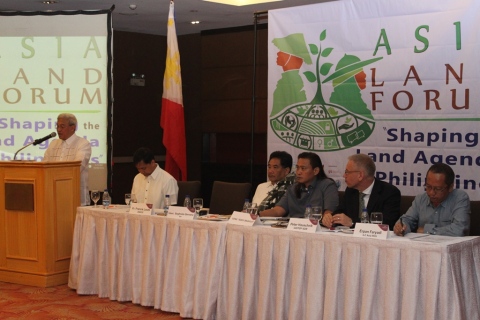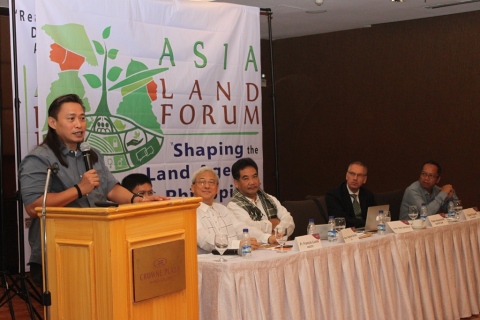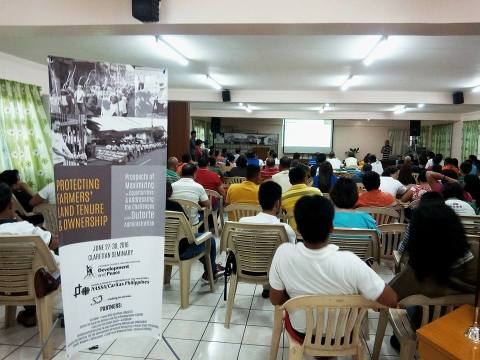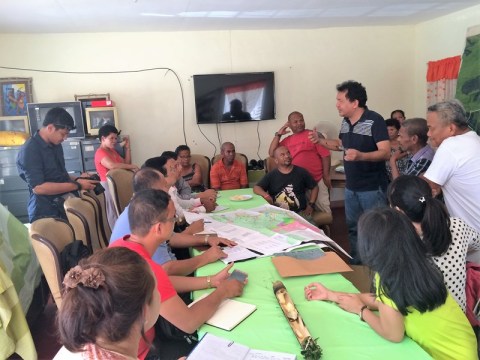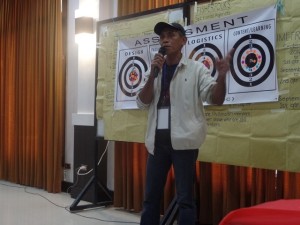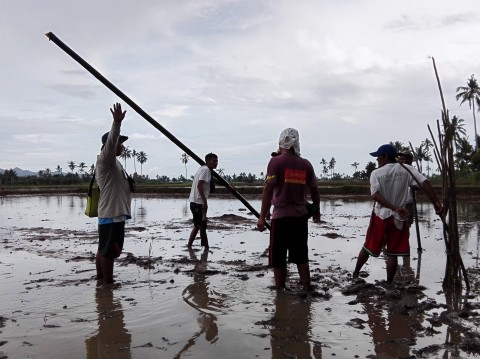Asia Land Forum: Shaping land agenda and defining land rights to achieve food sovereignty
The Asia Land Forum was held on 5 September 2016 in Ortigas Center, Quezon City, Philippines. Divided into two parts, the Forum engaged the Philippine Government on the proposed legislative land agenda of the CSO members of the International Land Coalition (ILC), and provided space for knowledge exchanges on achieving food sovereignty through advancing land rights. Around 85 participants from the Governments of Philippines, Nepal, and Cambodia; intergovernmental organizations (ADB, FAO, IFAD, WB); CSO representatives from Bangladesh, Cambodia, India, Indonesia, Kazakhstan, Kyrgyz Republic, Mongolia, Nepal, Pakistan, Philippines and Thailand took part in the discussion.
The morning session on “Shaping the Land Agenda in the Philippines” pressed on the land agenda for the Duterte Adiministration under the framework of land rights as human rights. Philippine CSO members of ILC demanded for the passage of the (i) Completion of Notice of Coverage Bill or the NOC Bill, (ii) Indigenous Community Conservation Area (ICCA) Bill, and (iii) the National Land Use Act (NLUA) Bill, collectively called as the “Triple Land Rights Bills,” to effectively address land rights issues that affects the lives of marginalized sectors such as indigenous peoples, farmers and fisher folks as well as the urban poor communities.
Wilson Requez of the People’s Campaign for Agrarian Reform Network, Inc. (AR Now!) discussed that more than 69,000 hectares (ha) of landholdings are yet to be covered for redistribution (DAR Status Report, 2016) under the Comprehensive Agrarian Reform Program (CARP). With the failure to pass the NOC Bill on completing the land acquisition and distribution provision of the CARP during the 16th Congress, it is hoped that in this 17th Congress, the Bill will be passed as the legislative champions for agrarian reforms both in the Lower and Upper Housed have already filed bills for the Completion of Notice of Coverage and are hoping to sustain the momentum it gained during the 16th Congress.
Dave de Vera of the Philippine Association for Intercultural Development (PAFID) highlighted the importance of ICCAs in conserving indigenous people (IP)’s lives and source of livelihood leading to biodiversity conservation. Hence, the passage of the ICCA Bill will further strengthen the mandate of the Indigenous Peoples’ Rights Act (IPRA) and will highlight the very important role of IPs in the conservation of our remaining resources.
Lastly, Elmer Mercado, EnP of the Campaign for Land Use Policy Now! (CLUP Now!) stressed that a clear land use policy through the NLUA should be passed to rationalize the use of lands and address the current degradation of country’s land resources.
Representative Teddy Baguilat committed to support the passage of these Bills in the current Congress.
During the afternoon session on “Realizing the sustainable development goals: Defending land rights of communities to achieve food sovereignty in the region,” participants discussed the food security priorities of international organizations and selected Asian countries and sustainable development goals in the context of hunger and land rights.
Fifty-two representatives of grassroots organizations, peoples’ movements and CSOs from 10 Asian countries signed the Quezon City Declaration on Food Sovereignty calling upon concerned States, institutions, and corporations to respect and adhere to the 12 principles of the Declaration on protecting and strengthening land rights towards food sovereignty. See Declaration here.
The Asian NGO Coalition for Agrarian Reform and Rural Development (ANGOC), the International Land Coalition (ILC), the GIZ, and the Philippine Development Forum-Working Group on Sustainable Rural Development Forum (PDF-SRD), in partnership with AFA, AR NOW!, CARRD, PAKISAMA, PAFID, TFM and XSF organized this event.
Ensuring famers’ land ownership in the new administration
On 27-30 June 2016, around 120 agrarian reform beneficiaries from 12 dioceses and agrarian reform advocates gathered together to share and reflect on the outgoing administration’s implementation of agrarian reform in a conference on Protecting Farmers’ Land Tenure and Ownership: Prospects of Maximizing the Opportunities and Addressing the Challenges in the Duterte Administration.
As a preparatory activity for this event, a local assessment was conducted from April to June 2016 to: (a) review the status or effectiveness of agrarian reform (AR) implementation; (b) determine problems/issues and responses from the government and/or community; (c) identify the program’s impacts to living conditions; and (d) to collect and collate existing local data on the program’s Implementation, particularly in the Land Acquisition and Distribution (LAD) component. The local assessment generally aims to analyze the government’s implementation of the agrarian reform program, and evaluate the Comprehensive Agrarian Reform Program with Extension and Reforms (CARPER) from the perspective of farmers and farm workers.
The local assessment was conducted in the Diocesan Areas in the Provinces of Bukidnon, Iloilo, Leyte, Masbate, Negros Occidental, Negros Oriental, North Cotabato, South Cotabato and Surigao, in which the Department of Agrarian Reform (DAR)’s performance is poor.
It was found that there needs to be reform in terms of bureaucracy and in policies. The participants urge to continuously rationalize and evaluate DAR’s bureaucracy from the national down to the village level, ensuring that officials and employees do their responsibilities. The group also encourages the new administration to review, amend or repeal controversial “anti-farmer” policies instituted by DAR.
The group has also identified the priority issues for the new administration to focus on during their first 100 days which include:
- Installation of agrarian reform beneficiaries to the land awarded to them
- Poor implementation of agrarian reform due to lack of political will DAR
- Cancellation of Certificates of Land Ownership Award (CLOAs)
- Human rights violations
- Overlapping and conflicting laws
To this, the new DAR secretary, Rafael “Ka Paeng” Mariano promised that he will personally visit provinces that encounter the worst problems on land rights such as Leyte, Masbate, Isabela, Iloilo and Sultan Kudarat. Furthermore, he vowed that no farmer, CLOA holder or not, will be forced to leave his/her farm.
Participants were hopeful that in President Duterte’s administration and the proclamation of Rafael “Ka Paeng” Mariano as DAR secretary, their problems would be attended and resolved.
The National AR Conference was organized by NASSA/CARITAS Philippines, in partnership with the Canadian Catholic Organization for Development and Peace, AR Now!, ANGOC, CARRD, Focus on the Global South, KAISHAN, PAKISAMA, PhilDHRRA, Rights Network/ KATARUNGAN, TFM and Sulong CARHRIHL.
For more information, please contact Wilson Requez of AR Now! at wkrequez@gmail.com
Highlighting land tenure security in drafting the New Urban Agenda for Habitat III
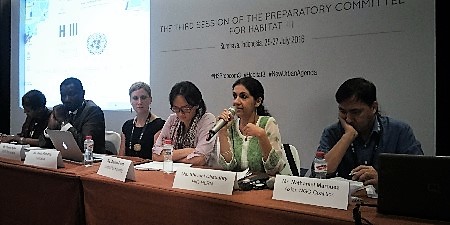
Panel during the side event on Land and Housing at the Core of the New Habitat Agenda. Photo by Habitat International Coalition.
During the third and Preparatory Committee session for the Third United Nations Conference on Housing and Sustainable Urban Development or Habitat III in Surabaya, Indonesia on 27 July 2016, the Global Land Tool Network (GLTN) in collaboration with UN-Habitat, Huairou Commission, Habitat for Humanity International, Landesa, Habitat International Coalition (HIC), and the Asian NGO Coalition for Agrarian Reform and Rural Development (ANGOC) hosted a side event on Land and Housing at the Core of the New Habitat Agenda: Recommendations and Key Messages.
The side event aimed to analyze the centrality of ensuring tenure security and rights to adequate and affordable land and housing for the success of the New Habitat Agenda, and describe good practices, tools and links to policy instruments that promote secure tenure for all and responsible land governance.
Recognizing that land is a key driver to urban and rural development, speakers have highlighted the importance of securing land tenure rights for all to enhance resilience to the impacts of climate change, mediating competing interests, while ensuring transparency and accountability. Discussed as well are the importance of land use planning in ensuring sustainable and safe cities and human settlements; and women’s access, ownership, inheritance, and control over land in transforming their wellbeing, economic and social status, resilience to disaster and climate threats, and for the development of the community and society.
ANGOC Executive Director Nathaniel Don Marquez has presented the works of the Land Watch Asia (LWA) Campaign during the session on “Sustainable Land use and responsible land governance.”
Discussions in this side event will be an input to the drafting the New Urban Agenda which will be announced during the Habitat III Conference on 17-20 October in Quito, Ecuador.
“Towards Thematic Reviews for an Integrated Follow-Up & Review of the 2030 Agenda”
We are sharing the highlights of this event posted by the IISDA Reporting Services.
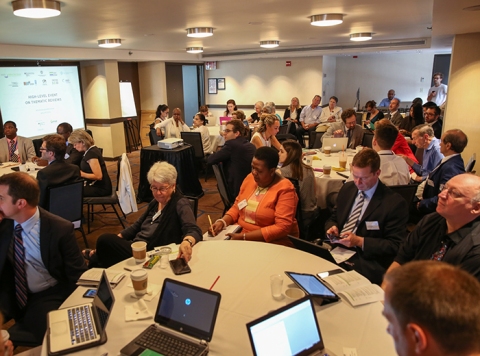
Participants of the high-level event. Photo by IISD.
With the view of addressing the framing of a thematic review progress in implementing the 2030 Agenda for Sustainable Development and the Sustainable Development Goals (SDGs) among over 150 countries, the Institute for Advanced Sustainability Studies (IASS) and partners, with support from the German Federal Ministry of Food and Agriculture (BMEL) and Fachagentur Nachwachsende Rohstoffe e.V. (FNR), organized a high-level event themed, Towards Thematic Reviews for an Integrated Follow-up and review of the 2030 Agenda last 7-8 July 2016 in New York City.
The event provided an opportunity to around 100 country representatives from Permanent Missions to the UN, UN agencies, multilateral environmental agreements (MEAs), academia, civil society, and private sector to discuss initial considerations regarding the requirement and framing of natural-resource related thematic review.
In a plenary session, participants recognized that conducting thematic reviews would offer room for inputs by stakeholders, and that it can provide an assessment on how follow-ups and reviews should be designed; hence, offering necessary space for the discussion to address linkages.
On breakout sessions, it was highlighted that the framework should focus on reducing complexity and ensuring integration, on linking with the official High-level Political Forum on Sustainable Development (HLPF) process, and on accountability and empowerment – all with the participation of non-UN stakeholders.
The event concluded with the steps towards inclusive and integrated thematic reviews, with participants stressing the need to fully engage civil society and all stakeholders; the size, organization and financing of the HLPF Secretariat; the need to better communicate the SDGs to the public; the value of synthesizing views through non-UN processes; the need for central leadership for SDGs implementation; and how to overcome disinterest among academia and the general public in SDG implementation.
Philippines is one of the signatories of the 2030 Agenda. ANGOC took part in this high-level event.
Cambodian CSOs visit the Philippines
To learn about the land and housing laws, and the strategies of the CSO in ensuring the access of resource rights among the sectors, the NGO Forum on Cambodia (NGOF) organized the Learning Visit on Land and Housing Rights in the Philippines on 26-28 July 2016. Representatives from Sahmakum Teang Tnaut (STT), Focus on the Global South, Equitable Cambodia (EC), and Community Legal Education Center (CLEC), and ADHOC Cambodia also took part in the study tour.
Hosted by ANGOC, the first day focused on the Philippine land laws and the strategies and experiences of CSOs in pursuing their advocacies on agrarian reform and land use. While Philippines has many asset reform laws rooting to the Philippine Constitution of 1987, they are highly sectoral in approach; thus overlapping provisions and jurisdictions persist in the country resulting to resource conflicts among different sectors. Hence, the Philippine CSOs push for the passage of the National Land Use Act (NLUA) Bill. CSOs and advocacy groups who presented their advocacy experiences were The People’s Campaign for Agrarian Reform Network Incorporated (AR Now!), Center for Agrarian Reform and Rural Development (CARRD), and Campaign for Land Use Policy Now! (CLUP Now!).
On the second day, Cambodian CSOs visited the Community Organizers Multiversity (COM) office to hear about the Urban Development and Housing Act (UDHA) as the main Philippine law on urban housing. They have also learned the initiatives COM conducts to ensure proper implementation of the said law. They have visited a site where an urban housing project is being implemented in Manggahan, Pasig City to learn the experiences and struggles of the Alliance of People’s Organization along Manggahan Floodway Pasig (APOAMF) in successfully fighting for their right to live within city through a near-city housing relocation site project which they, themselves, have developed and proposed to the Government.
Lastly, the Cambodian CSOs visited and learned from the Pastolan indigenous community in Hermosa, Bataan, who have successfully claimed their ancestral domain title with the support of the Philippine Association for Intercultural Development (PAFID). Visitors have also learned how the government and the indigenous community have sustained a harmonious relationship to one another in a dialogue with the Subic Bay Metropolitan Authority (SBMA).
Training of trainers on increasing the use of VGGT
On 11 May 2012, Philippines was one of the 98 countries in the Committee of World Food Security (CFS) who officially endorsed the Voluntary Guidelines on Responsible Governance of Tenure of Land, Fisheries and Forests in the Context of National Food Security (VGGT) in Rome, Italy. VGGT is as a set of guidelines that can be used as a reference, given the different national contexts that need to be taken into account in defining the governance of land and natural resources.
ANGOC has been promoting the use of VGGT through implementing projects partnered with national and international organizations such as GIZ-Philippines, National Convergence Initiative for Sustainable Rural Development (NCI), and Philippine Development Forum – Working Group on Sustainable Rural Development (PDF-SRD).
On 11-14 July 2016, FAO and ANGOC conducted the training of trainers on “Increase the use of the Voluntary Guidelines on the Responsible Governance of Tenure of Land, Fisheries and Forests (VGGT) among CSOs and Grassroots Organizations in the Philippines” in Tagaytay City.
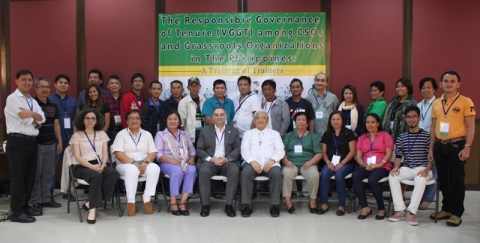
Participants of the training of trainers on “Increase the use of the VGGT among CSOs and Grassroots Organizations in the Philippines.” Photo credits to CMN.
Twenty two farmers, fisherfolks, indigenous peoples, and CSOs from different parts of the country participated in the workshop to increase their understanding and use of VGGT within the national context with the view of improving land governance in the country. The four-day course: (i) fostered understanding on the background and process of the VGGT; (ii) explained the main topics covered by the VGGT; (iii) identified main actors and processes and their respective roles; and (iv) formulated an action plan to apply the VGGT in support of land rights work of the basic sectors.
From their own experiences on non-recognition of their rights, participants assessed the threats of their cases, the actors and their roles and influences.
With what they have learned from the lectures on the VGGT and its applications in the national and global level, participants were able to draw the VGGT principles in analyzing their own situations through a role playing activity. It demonstrated a particular case involving a policy implementing an investor-supported project while oppressing the rights of the basic sectors.

Participants during the role playing demonstrating VGGT’s use in analyzing scenarios on resource governance. Photo credits to CMN.
Participants were able to reflect how their rights are threatened and how they can use VGGT in protecting and demanding for their rights.
The workshop concluded with an agreed intersectoral framework to better popularize the VGGT as an immediate action plan (see diagram below). Training design will be reviewed and appropriate training modules will be further developed for the use of basic sectors on the ground. Also, tools for assessment on governance of tenure will be developed to equip sectors in evidence-based advocacies. These will be initiated by a VGGT Reference Group composed of each basic sector’s representatives.
Related resources:
These VGGT desk studies were prepared to identify existing gaps in policies and programs on the governance of land and resource tenure in the Philippines, and to familiarize stakeholders on the VGGT. Download the publications here.
Workshop on land conflict resolution in Cambodia
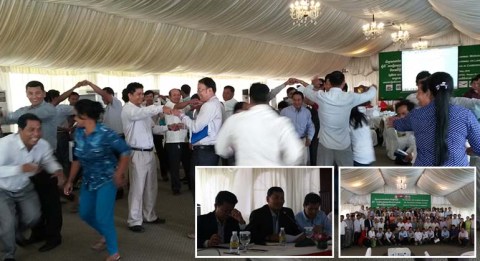
Participants on a knowledge exchange activity. Photo by MRLG. Retrieved from http://demo1.mrlg.org/wp-content/uploads/2016/06/2-work-shopccccccccc-1.jpg
Star Kampuchea (SK), Analyzing Development Issues Centre (ADIC), and Cambodian Women Media Center (WMC), with support of Mekong Region Land Governance (MRLG), conducted a workshop on Collective Learning on Land Conflict Resolution in Cambodia on 26-27 May in Phnom Penh.
More than 100 participants from CSOs, private, and policy sectors joined in the discussion and knowledge exchange focusing on:
- Causes of Land Conflicts in Cambodia
- Land Conflict Resolution Mechanism
- Land governance World Café: What is for you the main concern on land governance? What is the priority to improve land governance?
- Storytelling on Land Conflict Resolutions
- Law Enforcement Related to Land Management in Cambodia
- Land Conflict Prevention
Bantheay Meanchey Province Deputy Governor H.E. Ly Sary encouraged for more future conduct of this kind of event with more participations of provincial governors to discuss ways to improve land governance in Cambodia.
Philippines: Lands that farmers can finally call their own
We are posting this story shared by Kaunlaran ng Kanayunan at Repormang Pansakahan (KAISAHAN).
After 20 years of land acquisition struggles, 23 farmer beneficiaries in Barangays Sumanga and Valenciana in Ormoc City, Leyte have been successfully installed to the lands they have long been awarded with certificates of land ownership (CLOA).
The Department of Agrarian Reform (DAR) led the installation on 20 and 21 June 2016 in the two villages together with some 300 officials and representatives from the Philippine National Police (PNP), Commission on Human Rights (CHR), and other advocacy groups including KAISAHAN.
This long-time story of unsecured land tenure of farmers roots to landowners’ resistance to the redistribution. Whenever installation is attempted, farmers receive threats and intimidation from the previous landowners, Larrazabal, resulting to repeated failures of the process. The last time was on 9 February 2016.
Even up to the day of this event, previous landowners have been continuously resisting. KAISAHAN Executive Director Anthony Marzan and legal officer Atty. Claire Demaisip reiterated to the opposing party that only a temporary restraining order from the Supreme Court can postpone the instalment.
To secure the post-installation situation, KAISAHAN has insisted of putting up a PNP detachment until the peace and order in the area is assured. Farmer groups and federations in the areas have also assured that they will provide support services to the new farmer-landowners to ensure sustainable use of their lands.
20 years of injustice
We are posting this story shared by Kapaeeng Foundation.
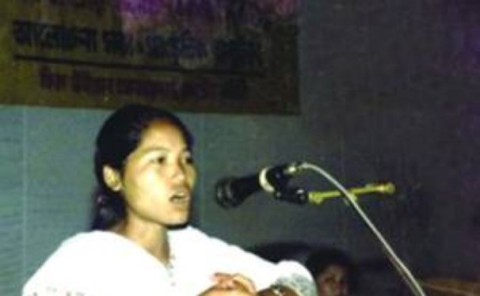
Kalpana Chakma. Photo retrieved from http://www.thedailystar.net
On 12 June 1996, then Hill Women’s Federation Organizing Secretary Kalpana Chakma was abducted and killed at her house in New Lalyaghona, Baghaichari Upzila, Rangamati District by the members of Bangladesh Army.
Up to this date, the case has not been adjudicated. Police repeatedly fails to submit report in the court.
While the Government formed an inquiry committee after three months of the incident, committee members failed to identify the perpetrators. In May 2010, police submitted a probe report with misleading contents, allegedly to cover up for the perpetrators. As the complainant – Kalpana’s brother, protested against tampered reports and documents, the case was continuously and repeatedly transferred to different investigatory departments and courts.
Even with the failure to address the case for the 30th time last 8 May 2016, there are hopes that the Investigating Officer will submit on 12 July 2016, and will finally give progress to Kalpana’s case.


